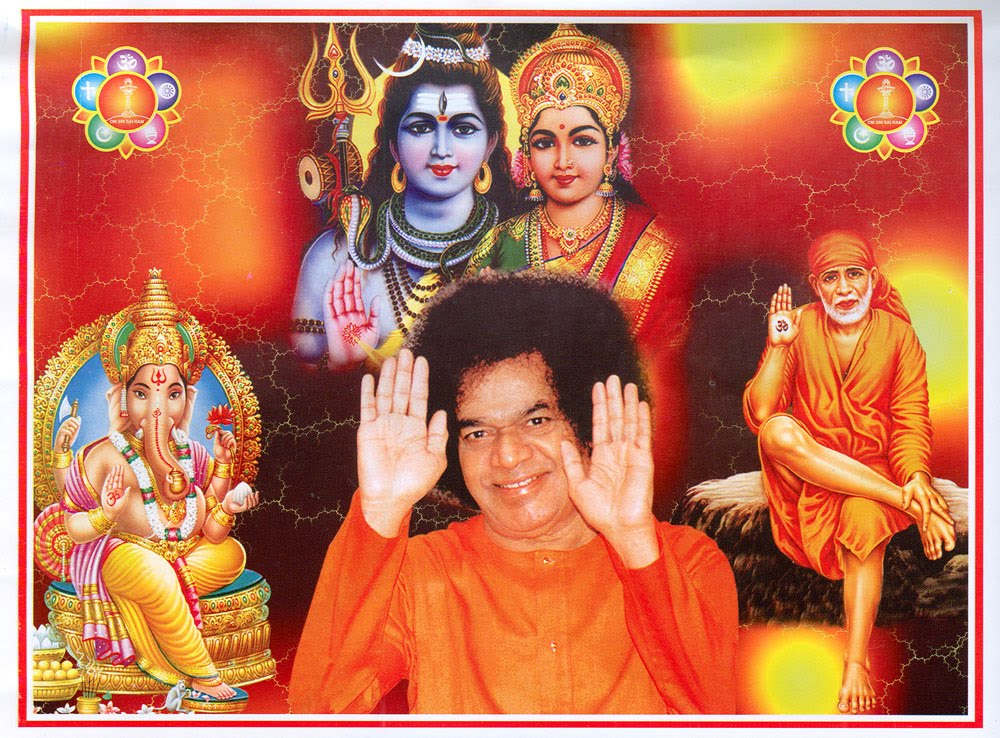| Home SBOI-Group Pictures Audio-Video Wallpapers Greeting-cards Ashrams Info. | ||||||||||||||||||||||||||||||||||||||||||||||||||||||||||||||||||||||||||||||||||||||||||||||||||||||||||||||||||||||||||||||||||||||||||||||||||||||||||||||||||||||||||||||||||||||||||||||||||||||
Birthday of Lord Krishna  | ||||||||||||||||||||||||||||||||||||||||||||||||||||||||||||||||||||||||||||||||||||||||||||||||||||||||||||||||||||||||||||||||||||||||||||||||||||||||||||||||||||||||||||||||||||||||||||||||||||||
Friday, Aug 14 , 2009 Kulwant hall - Prasanthi Nilayam The Sai Kulwant hall was decked for Krishnashtami from last evening with blue cloth decorations and a Krishna statue onstage. Bhagavan had come for darshan at 6.15 pm yesterday and had accepted Arati after more than 90 minutes of bhajans at 6.35 pm. This morning, students from all three campuses of the University were present for darshan, along with a contingent from the institutions at Muddenahalli and Alike and a group of devotees from Maharashtra. Swami gave Janmashtami darshan clad in a yellow robe seated on the special white chair at 9.20 am. After His darshan round, He moved to the interview room and emerged after nearly an hour to accept Arati onstage at a quarter past ten. He went to the interview room again briefly before returning to His residence in the car.
gave darshan. Once He sat onstage for a few minutes, He asked for bhajans to be sung, and prasadam was distributed. At 6.20, He accepted Arati and returned to His residence. A meeting of the "thyagajeevi"s of the institutions at Muddenahalli and Alike along with many of those working at Bhagavan's institutions at Prasanthi Nilayam and Brindavan was arranged over the weekend at the hall in the building adjacent to Swami's residence. This evening after bhajan, there was an orientation lecture session there after the evening bhajan for an hour. | ||||||||||||||||||||||||||||||||||||||||||||||||||||||||||||||||||||||||||||||||||||||||||||||||||||||||||||||||||||||||||||||||||||||||||||||||||||||||||||||||||||||||||||||||||||||||||||||||||||||
Sri Krishna Janmashtami
Today we celebrate Krishna's birthday. Where was he born? In a prison. What were his possessions? Nothing. Born in a prison, he was taken to the house of Nanda, and then he went to Mathura. He owned nothing. But he became the greatest figure in the world. What does this show? Worldly possessions are not the secret of greatness. Krishna's greatness consisted in His permanent state of bliss (ananda). If you recognise the distinction between Krishna and Rama, you will appreciate Krishna's nature better. Krishna always smiled at the outset and carried out his task later. For Rama, the deed came first and then the smile. Krishna made women cry. Rama wept for the sake of women. Rama went into the battle only after having a strong cause for it. Krishna first provoked the conflict and then determined its outcome. The Krishna principle revels in delight. The Rama principle is based on the concept of obligation (baadhyatha). The Ramaayana is intended to promote the reign of truth and righteousness on earth. The Krishna Avathaar was intended to give a perennial message to the world. He sought nothing for himself. He kept nothing for himself. He gave away everything to the people. He slayed his maternal uncle, Kamsa. He installed Kamsa's father, Ugrasena, on the throne. He did not covet the kingdom. He befriended the Pandavas, defeated the Kauravas, and crowned Dharmaja as the emperor. He did not make himself king. He was a king without a crown. He was the king of kings. He had no kingdom of his own. But he ruled over the hearts of the millions. It is this profound truth that is proclaimed by the Krishna principle (Krishna thathva). If you enquire deeply, you will find that every Avathaar has incarnated to convey a special message and carry out a particular mission. Divine Discourse: Sri Krishna Janmaashtami, 4 September 1996 The incarnation of Krishna proclaimed the doctrine of divine love, as manifested by the cowherd maids (Gopikas). Today, man is like an earthen pot filled with nectar. His body may be made of clay, but his spirit is eternal. The Divine has to be experienced through the body. Hence, human birth should not be treated as something trivial. Human life is worth living --it should be cherished as something precious. But today, such a precious gift is being treated as dirt. It is essential to realise the value of human existence. What is the goal of human life? It is to go back to the source from which we came. Our duty is to return to our primordial, original home. All of you who are here have come from different parts of India and the world. After your stay here, you have to go back to your native places. Likewise, human beings have come to the planet earth as pilgrims. They have to return to their original home. You have come from the Aathma. You have to go back to the Aathma. You have come from the Brahman (Supreme Self). You have to merge in the Brahman. You have incarnated as a spark of Brahman. You have to become the Brahman. That is the ideal. That is the goal. In between, there may be many impediments. You should ignore them. Have unshakable faith. That is true devotion. Divine Discourse: Sri Krishna Janmaashtami, 18 August 1995 Whatever you do, remember the Omnipresence of the Divine. Do every act to please God, out of love and not out of compulsion. Divinise every act. The Lord declares in the Gita, "Having been born in this transient and unhappy world, worship Me." Krishna called upon Arjuna to stand up and face the battle, reminding him of what was in store for the evil minded Kauravas. He adjured Arjuna to have full faith in Him and do his duty. Then Arjuna declared, "I shall do as You bid me (Karishyevachanam thava)." Then Krishna declared, "You have now become My true devotee." And He exhorted Arjuna to rise and fight the battle, which would end in the complete destruction of the Kauravas and the wicked quartet, Duryodhana, Dussaasana, Karna, and Sakuni. The great teaching of the Gita is this: Put your trust in God, carry on your duties, be helpful to everyone, and sanctify your lives. Dedicate all actions to God. That is the way to experience oneness with God. God is in you. You are in God. This oneness is the basic truth. Chant the name of the Lord and render social service in a spirit of selflessness and devotion to God. Divine Discourse: Sri Krishna Janmaashtami, 18 August 1995 Krishna is omnipresent. The word has three meanings: (1) "Krishithi-ithi Krishna --The man who ploughs is Krishna." The heart is the symbol of a field. The heart should be cleared of weeds (evil qualities). It should be filled with love. The seeds of the Lord's name should be sown in it. Krishna encourages the devotee to do all this. (2) "Karshathi-ithi Krishna --Because he attracts, he is Krishna." Krishna has the supreme power of attraction. By his words, his sport, his music, and all his actions he attracts all people. This power of attraction is present in everyone. Hence, everyone is potentially Krishna. (3) "Krushyathi-ithi Krishnah --Because he imparts bliss, he is called Krishna." Everyone seeks happiness. The Divine, who is the embodiment of happiness, is in you. God wants you to be happy, but you do not realize it. Try to recognize the source of bliss within you. It is not the true nature of man to be unhappy. When anyone is otherwise, people around him are concerned about him. You should always be happy, because you are the embodiment of the Aathma. Never give way to worry. As a spark of the Divine, you have to behave like the Divine. Do not give room for grief. What use is there in turning over the beads of the rosary while your mind is thinking of mundane matters? First of all, purify your mind. Dedicate all actions to God. Free yourself from all attachments. Treat all things as gifts from God for which you are the guardian and not the owner. Divine Discourse: Sri Krishna Janmaashtami, 25 August 997
| ||||||||||||||||||||||||||||||||||||||||||||||||||||||||||||||||||||||||||||||||||||||||||||||||||||||||||||||||||||||||||||||||||||||||||||||||||||||||||||||||||||||||||||||||||||||||||||||||||||||
Gita (Saar) Summary
The teachings of Lord Krishna have been written down in a book famously known as 'Bhagwad Gita'. It is the holy book of Hindus. It is to Hindus, what Bible is to Christians or what the holy Quran is to Muslims. Since the book is quite big and extensive, sometimes it becomes difficult for a person to read at a stretch. Geeta Saar is the gist of the main teachings of Lord Krishna. It contains the crux of the Holy Gita.
| ||||||||||||||||||||||||||||||||||||||||||||||||||||||||||||||||||||||||||||||||||||||||||||||||||||||||||||||||||||||||||||||||||||||||||||||||||||||||||||||||||||||||||||||||||||||||||||||||||||||
 Sai Baba themed Krishna Janamasthmi greeting cards | ||||||||||||||||||||||||||||||||||||||||||||||||||||||||||||||||||||||||||||||||||||||||||||||||||||||||||||||||||||||||||||||||||||||||||||||||||||||||||||||||||||||||||||||||||||||||||||||||||||||
| 108 names of Lord Krishna - Popular names of Lord Krishna - Shri Krishna names- Different names of Lord Krishna | ||||||||||||||||||||||||||||||||||||||||||||||||||||||||||||||||||||||||||||||||||||||||||||||||||||||||||||||||||||||||||||||||||||||||||||||||||||||||||||||||||||||||||||||||||||||||||||||||||||||
| ||||||||||||||||||||||||||||||||||||||||||||||||||||||||||||||||||||||||||||||||||||||||||||||||||||||||||||||||||||||||||||||||||||||||||||||||||||||||||||||||||||||||||||||||||||||||||||||||||||||
The below prayers can be told daily by offering flowers or Tulasi to Lord Krishna.It contains 108 Names of Lord Krishna taken from Vishnu Sahasranama
| ||||||||||||||||||||||||||||||||||||||||||||||||||||||||||||||||||||||||||||||||||||||||||||||||||||||||||||||||||||||||||||||||||||||||||||||||||||||||||||||||||||||||||||||||||||||||||||||||||||||
Krishnashtami | ||||||||||||||||||||||||||||||||||||||||||||||||||||||||||||||||||||||||||||||||||||||||||||||||||||||||||||||||||||||||||||||||||||||||||||||||||||||||||||||||||||||||||||||||||||||||||||||||||||||
Sri Krishna Jansmashtami celebrates the birth of Lord Krishna, the Avatar of the Dwapara Age. Many are the saints of this land who have dedicated their life to the adoration and veneration of Lord Krishna. Tulsidas, Meerabai, Chaitanya Deva and Purandaradasa poured out their devotion to Lord Krishna in the form of songs which remain popular in Bharat even to this day. The story of His life and His leelas (Divine sport) has enchanted the people of Bharat for millennia, for it tells us about God’s pure love for His devotees. Krishnashtami is a festival whose celebration is marked by fun and gaiety that recalls the joy experienced by the Gopalas and Gopis (cowherds) in the company of Krishna during His childhood days at Brindavan.
At Prasanthi Nilayam, this experience is enhanced by the presence of the same Lord Krishna who has come again as our beloved Bhagawan Sai Krishna.






























No hay comentarios :
Publicar un comentario